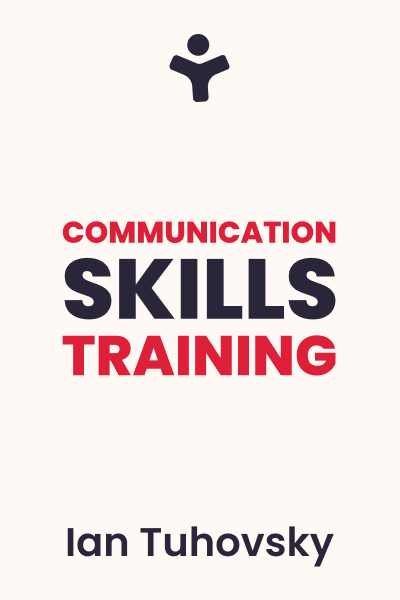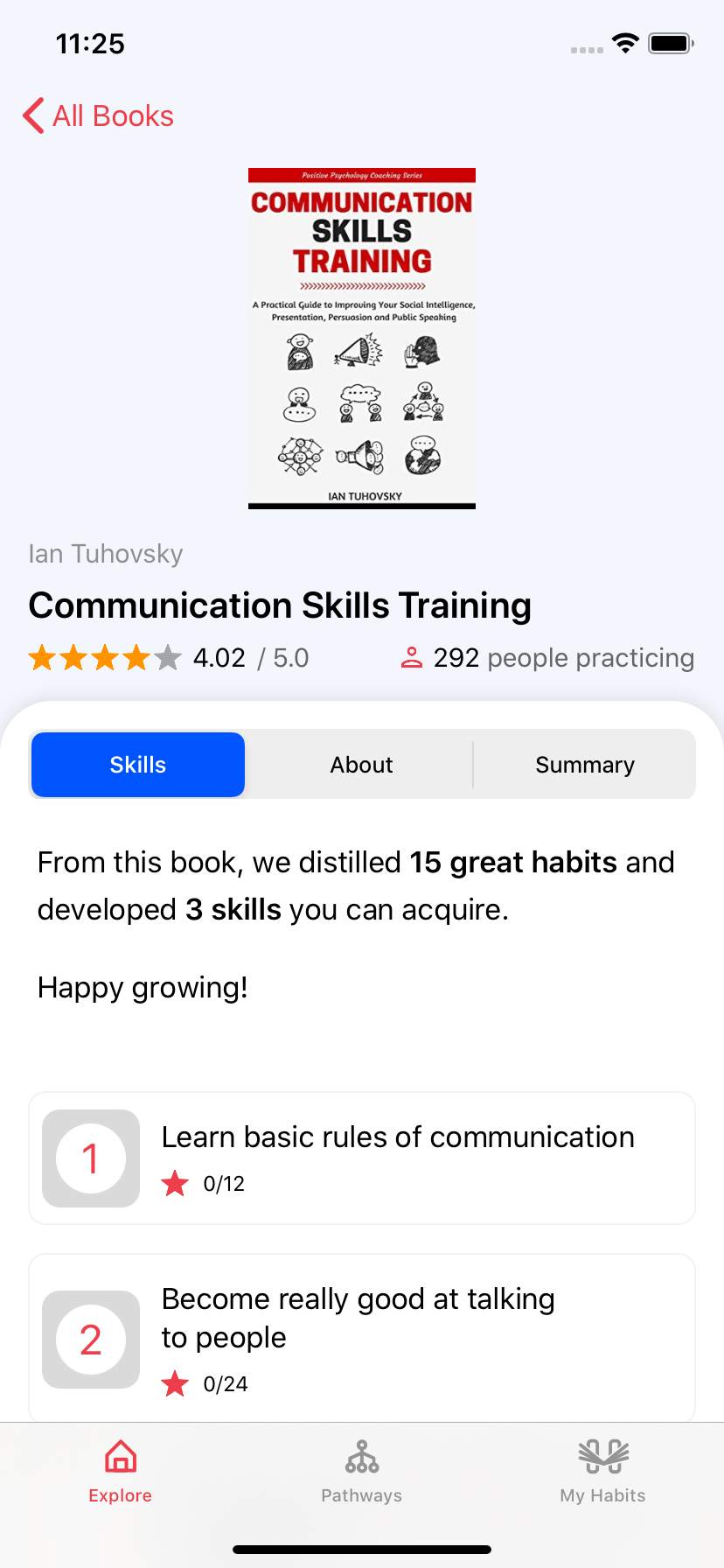
Communication Skills Training: A Practical Guide to Improving Your Social Intelligence, Presentation, Persuasion and Public Speaking
by Ian TuhovskySuccessful communication is one of the most important skills that you can have. Pretty much every successful person will tell you that they got successful because of their great contacts with other people.
Communication Skills Training has plenty of great ideas you can apply directly to your life. They are easy to read, easy to understand, and easy to adopt.
Introduction
“Effective communication is like an engine oil that makes your life run smoothly, getting you wherever you want to be.”
Communication skills are one of the most useful skills we may have. However, this is not taught in schools and obtaining this knowledge from mass media is difficult. There are not many teachers or television programs teaching us how to strengthen this highly essential skill.
When we lack communication skills, succeeding in several areas of our life will be tough. We need it to strengthen personal relationships, negotiate with clients, manage our employees, and deal with any other conflict that may arise. This explains why we should learn and practice improving this skill.
To do so, we must possess the right attitude, apply the right knowledge and practice certain abilities. Moreover, we must pay close attention to our communication patterns and constantly analyze our communication styles. We also need to find the motivation to work on our personal development to keep improving our quality of life.
Actions to take
A Map Is Not Actual Terrain
“There is no one objective truth.”
We all have different mental world maps, meaning we perceive reality differently. This stems from having different life experiences, beliefs, values, and expectations that influence our perceptions.
For example, if you ask several people about their meaning of the word “love,” they are likely to produce different answers. Some people associate it with dreaminess, while others associate it with pain and misery. Whatever their responses are, it’s important always to consider their map of reality and understand where they’re coming from.
An effective communicator knows how to empathize with another person’s map of reality rather than arguing over who is right. This allows them to understand people deeper, find the middle ground in every situation, and cultivate lasting social relationships.
Actions to take
The Eight Most Important Communication Rules
“Some of the most basic communication mistakes (for example, telling your children or employees what they shouldn’t do instead of what they should do) are so common that despite their dysfunctionality, they are perceived as something “normal” by most people.”
There are several rules we must follow to communicate effectively. Failing to adhere to these rules can result in misunderstandings and conflicts with the people we communicate with. Here are the following rules:
- Make everything you say possible to realize: Clearly communicate your message and the action the receiver should take. Otherwise, your message cannot be done and is useless.
- Precisely formulate what you say: Your message can be perceived differently by people, resulting in misunderstandings and unmet expectations. To avoid this, be precise with your words.
- Positively formulate what you say: Only telling people what they should not do will not help them improve. It will just leave them clueless about how you expect them to act. So, it’s best to formulate your message positively by focusing on what they should do instead of what they shouldn’t.
- Remember always to take responsibility for yourself: How we process and understand a message is highly influenced by our mental filters. Instead of worrying about others’ interpretation of our message, it’s best to just focus on understanding ourselves and knowing exactly what we want to communicate.
- Describe measurable facts instead of trying to read minds: Accurately reading people’s minds is impossible. Instead of predicting what other people think or feel, it’s better to focus on reality by asking and listening directly to their responses.
- Always describe your feelings without attacking and offending your interlocutor: Offending or attacking your interlocutors triggers their defense mechanisms. It's best to express our sentiments in a way that doesn't undermine others' integrity and self-image or result in negation. For example, instead of saying “You don’t love me!” to your partner, say, “I felt sad when you said I looked bad in my dress yesterday.” Then, let them explain and tell them how they should better deal with the situation next time.
- Express opinions about people’s behavior, not about them in general: When evaluating or giving feedback to people, focus on their behavior rather than their personality themselves. This is because of two reasons: behaviors are harder to change, and it’s harder to offend someone when relating to their behavior.
- Say directly what you want to communicate: Avoid telling double-meaning statements as it could damage trust and cause conflicts. Rather, be direct with your message so people will receive it properly and positively.
Successfully incorporating these rules into your daily conversations requires systematic practice and awareness. Therefore, you must regularly evaluate whether you adhere to these rules in every conversation.
Actions to take
How to Express Anger and Avoid Conflicts
“Every emotion is a result of our thoughts.”
There is no point in blaming others when we feel bad. It makes no sense at all on a practical level of reason. If we want to solve the matter constructively, we have to allow that person to understand what is happening inside us and how we really feel.
When you accuse someone of something, the accused person has two possible choices: to take your words personally (which will make them feel hopeless and restrain them from changing their behavior) or to reject them (which won’t change their behavior either).
Actions to take
The Most Common Communication Obstacles
“If you want to improve your communication skills, you need first to recognize your limits, then really think about all the things holding you back while interacting with other people. “
Several obstacles may hinder us from becoming effective communicators. Being aware of these obstacles is the first step to avoiding them. Once we learn how to overcome these obstacles, we’ll surely see a huge improvement in our social and professional lives.
- Playing a judge: You believe you’re the only one with the right to be right, so you tend to criticize people for not thinking or acting the way you want or expect them to be.
- Feeling the need to finish sentences for others: You often interrupt and finish people's sentences without being told to, which can frustrate people and damage relationships.
- Being the uncle of good advice: You keep giving unwanted advice, thinking it would help people solve their problems. In actuality, it just makes them feel uncomfortable.
- Being a moralizer: You often give irritating comments to the people you’re conversing with, like saying, “How can you listen to this kind of nasty music?”
- Being “the talker”: You are very open to people, making you talk to them excessively even when it’s unnecessary. This can annoy people and ruin early relationships.
- Impolitely dealing with people who don’t let you speak: We're quickly offended when others don't let us talk. Wrongfully dealing with this can lead to conflicts. Instead, we should learn how to interrupt them when we want to say something politely.
- Saying the wrong comforting words: While comforting someone is a good thing, it can make people feel bad if we do it wrongfully. Saying phrases like “Don’t worry” or ”It’s not that bad” can discourage them from overcoming and dealing with their problems.
- Losing focus: The tendency to be distracted while listening to others can make us miss valuable information from the people we converse with. Failing to address this problem can lead to misunderstandings and damaged relationships.
Aside from overcoming these obstacles, another beneficial way to improve our communication skills is by smiling more often. Our brains will function much better when we do, and other people will see us as more sociable and friendly. What's more, we will also improve our humor and feel much better in the process.
Actions to take
Five Most Basic and Crucial Conversational Fixes
“You need to know that listening builds trust. The more you listen to another person, the more they trust and believe in you.”
There are several conversation fixes we need to apply to improve our conversation skills a lot. When applied correctly, these fixes can build our self-esteem, empathy with others, trust, and self-discipline. The last fix will help us with difficult questions and not very honest conversation partners.
- Stop for a moment: When we pause for a moment before responding to a conversation, we avoid interrupting the person who might just be taking a breath before continuing. We show them we’re listening carefully and considering what they’ve said.
- Ask for clarification: Instead of assuming you understand, ask questions to clarify. This helps you grasp their messages well and keeps the conversation going as they elaborate their responses more.
- Paraphrase: By paraphrasing the words of the person you’re conversing with, you show that you are attentive to the conversation and make every effort to understand their message.
- Listen more, talk less: Listening is the foundation of trust; the more you listen to others, the more they trust you. Besides, it will also make people feel valued and respected. When we listen to others, we also increase our focus.
- Use the three-second look: When you feel like someone is lying to you, wait for them to stop talking and look them directly into their eyes for three seconds quietly, pressuring them to tell you the truth. You can also do this when you don’t want to answer somebody’s question to you.
Actions to take
How to Deal With Difficult People
“Dealing with difficult people is extremely important, especially in the corporate world or any other kind of professional life. It’s most important not only in everyday life but when you can’t afford to simply ignore them.”
Wherever we go, there will always be people we find difficult to deal with. It could be your boss who constantly annoys you or just someone who keeps getting on your nerves. In these cases, it’s crucial that we know how to deal with them professionally, like the great communicator you want to be.
The first thing to remember when dealing with these people is never to try to change them. Aside from it being impossible, it’s not also our job to transform them. Instead, learn to point out the annoying behavioral patterns of a person to help them improve.
Second, we should learn to set boundaries by not tolerating people disrespecting us, especially in public situations. Instead, teach them how to treat you well and never settle for anything less.
Third, we must understand that we all have different mental maps and positive intentions behind our every behavior. So if we disagree with someone’s viewpoint, we must respect it and realize they have their own reasons. We must learn to listen to them and be empathetic to their situation.
Fourth, we need to avoid talking too much and only focus on the behaviors of the difficult people we encounter. This is the best way to help them improve. Aside from this, we can also use suggestions to show interest in the opinion of the people that we find challenging to deal with. When we let them express their thoughts, much tension is released.
Lastly, we must maintain strong body language to show them we’re sending a firm message. This can be achieved by finding our tone of power, keeping our head straight, maintaining eye contact, and removing the physical barriers between the person we’re communicating with. This will show that you’re hard to knock down verbally when engaged in difficult conversations.
Actions to take
Phrases to Purge From Your Dictionary
“In both work situations and at home, there are specific “phrases of highly ineffective communication in our verbal repertoire which need to be eliminated completely and substituted with different, wiser and harmless phrases.”
Some phrases we usually use may negatively impact our conversation with others; thus, it’s better to remove them completely from our dictionary.
Each of these phrases can be very offensive and can be understood as a direct attack on the person we are talking to. For example, when we say, “But you just said, …,” we send the information that the second person changes their mind quickly and is inconsistent with what they are saying. It might be true, but using this expression may make them angry and put them in a defensive state. To avoid this, we must replace the phrase with something that evokes a positive response, like “I heard/I understood *something*.” By using different phrases, we keep the conversation in a much better emotional state.
Actions to take
The Subtle Art of Giving Feedback
“If you want someone to learn something, this person must be in a positive emotional state.”
Giving feedback to people is essential to helping them improve their performance in a specific task. However, wrongfully delivering it might aggravate and frustrate a person, preventing them from taking your advice seriously. Therefore, we need to be careful and learn how to properly provide feedback to people so that they will feel good and motivated to improve.
The sandwich feedback is the best way to do this as it will allow us to motivate people to improve positively. This consists of three steps: saying something positive first, then saying they need to improve, and finally ending it with positive emotion. To do it correctly, we need to give attention to details and show a willingness to help.
Actions to take
How to Have Unique and Memorable Conversations
“By doing a conscious observation while carefully listening to conversations of others and testing of various different concepts, I came to a sudden realization that how a particular conversation goes depends vastly on myself.”
Small talk is usually boring. When you talk to another person, you want to make an impact. You want to be memorable, not just another boring person. If your conversations are not as good as you would like them to be, there are several methods you can use to lead conversation like a master.
These methods include: using a very strong conversation starter, telling stories and metaphors, discovering your interlocutor’s beliefs and values, modulating your voice, asking penetrating questions about the topic, and finishing the conversation with positive emotions. When incorporated properly, these techniques can help create engaging conversations that can positively impact the people you’re talking to.
Aside from these techniques, another important thing to remember when communicating with people is their names. This will make them feel valuable to you and that you like them. If you don’t remember their name, it’s like saying, “I don’t care about you.” Well, you don’t want to give such an impression of yourself, don’t you?
Actions to take
Rapport, The Art of Excellent Communication
“The truth is, we like people who are similar to us, enabling us to trust them the most.”
Building rapport is an art. You may be both very similar to each other, and then the rapport will be there naturally. However, in most cases, you will have to build it if you want to get benefits from it. And the benefits are huge: building rapport is like making the other person like you. If they do, you can lead the conversation to any point you want.
The fascinating benefit of building rapport is that from the point you have a strong connection, you can change the other person's emotional state in any direction you want. This means trying to mimic the other person first, matching their energy, and then slowly moving toward the energy you want.
Actions to take
Ways to Have a Great Public Presentation
“The ability to act in front of a bigger group of people is one of the most desired skills among people interested in self-development.”
Being skilled at presenting your idea or performing publicly is essential in many areas of our life. We need it during presentations, business meetings or training, and even in everyday situations, like when we meet up with friends.
Preparation is critical for improving public presentations. Ensure you have your materials ready, including an outline of everything you need to speak about, at least a few days before your speech or performance.
Once prepared, record yourself speaking it and evaluate the speed and tone of your voice: Do you speak too fast or too slow? Do you use different tones aligned with the emotions you want to evoke from your audience? Make necessary adjustments if there’s something off with the way you speak.
When the day of your presentation arrives, make sure to come to the venue much earlier. Practice standing and speaking on stage and see if the audience can see and hear you clearly. A few minutes before your presentation, let go of everything and calm your mind. Have faith in yourself, be confident, and believe everything will turn out well.
Once on stage, maintain a good posture by standing straight, keeping your head high, and pointing your chin up. Show that you’re ready and qualified to speak about your chosen subject. Then, as you speak along, make the appropriate facial expressions that go with your words. Finally, make eye contact with your audience to establish a connection and encourage them to listen closely to your presentation.
Actions to take
Don’t just read. Act.


